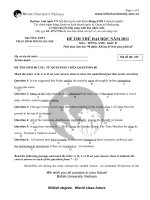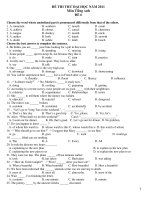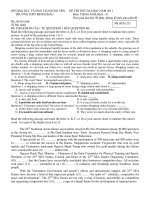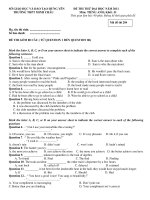ĐỀ LUYỆN THI THỬ ĐẠI HỌC NĂM 2011 MÔN : TIẾNG ANH – ĐỀ SỐ 6 doc
Bạn đang xem bản rút gọn của tài liệu. Xem và tải ngay bản đầy đủ của tài liệu tại đây (139.79 KB, 7 trang )
ĐỀ SỐ 6
ĐỀ LUYỆN THI THỬ ĐẠI HỌC NĂM 2011
MƠN : TIẾNG ANH – KHỐI D
Câu 1: (5 điểm)
Chọn từ có trọng âm chính nhấn vào âm tiết có vị trí khác với vị trí trong âm chính ở 3 từ
còn lại và viết chữ A, B, C hoặc D ứng với mỗi từ đã chọn vào phần trả lời.
1. A. Calculator B. Language C. Comprehend D. Institute
2. A. Challenge B. Counter C. Guardian D. Explain
3. A. Astonished B. Obstacle C. Disposal D. Apparent
4. A. Advertiser B. History C. Difficultly D. Adventurous
5. A. Alternative B. Impetus C. Ancestry D. Dividend
Câu 2: (10 điểm)
Chọn một từ/cụm từ thích hợp cho mỗi chỗ trống trong những câu sau và viết A, B, C hoặc
D ứng với từ/ cụm từ đã chọn vào phần trả lời.
6. The beautiful village is sheltered …………………………………………… the weather
by the mountain
A. from B. by C. in D. of
7. It is better to try to work ………………………………. rather than against nature.
A. for B. with C. by D. along
8. They wanted us to pay …………………………. cheque.
A. for B. in C. on D. by
9. Andrew came to the party …………………… he hadn’t been invited.
A. Although B. Despite C. incase D. even
10. PO box stands …………………………… “Post Office” box.
A. as B. like C. for D. by
11. …………………………. he was good at physics in lower grades, he was terrible at in
grade 12.
A. when B. While C. Except that D. Despite
12. The conference was organized for all of the ……………………………. in the city
A. history teachers B. historical teachers
B. historic teachers C. historian teachers
13. Unless we ………………………………… up to these problems, many species of
animals will become extinct.
A. look B. Run C. face D. get
14. “…………………………… do you go to the movies?” – “once a month”.
A. how far B. What Time C. How often D. How much time
15. The entrance exam is ………………………… far more difficult than the end of term
one.
A. at B. by C. in D. from
Câu 3: (20 điểm)
Hoàn thành mỗi câu sau với dạng thích hợp của từ trong ngoặc bằng cách viết dạng từ thích
hợp đáo vào phần trả lời.
16. This volcano is dead; it has been ………………… for more than a century.(ACT)
17. There’s a serious …………………… of food in the disaster area.(SHORT)
18. He’s the only child in his family and hardly enjoys ………………(BROTHER)
19. Nobody is happy with their ……………………… explanations they gave for the
failure. (CONVINCE)
20. IN nursing, women tend to ………… men by four to one. (NUMBER)
21. “bye-bye” is a more…………………… word than “Goodbye”.(FORM)
22. Tests are often carried out to detect genetic ……………… before birth. (NORMAL)
23. It’s very …………………………… of you to bring your umbrella today. (SENCE)
24. ………………………… to a new environment is a difficult thing for old people.
(ADAPT)
25. The Result is impossible to predict with any degree of ……………………
(CERTAIN)
Câu 4: (20 điểm)
Tìm một từ thích hợp cho mỗi chỗ trống được đánh số từ 26 đến 35 và viết từ đó vào vị trí
tương ứng trong phần trả lời.
If you live in a city, you probably see many people, hear the (26)
…………………… of traffic, and smell the pollution (27) ………………………. cars
and factories.
We are entering a new time in (28) …………………………… history of the
world. Before this, most (29) ………………………. Were farmers. They lived in the
country. Now many people are (30) …………………………… the farms and moving
into the cities. They are looking for better jobs. The cities are growing very quickly. Most
cities very crowded. People are driving more cars, burning more fuels,(31)
…………………………………. More water, eating more food, making more garbage, and
producing more things in factories than (32) ………………… before. Life is becoming
difficult.
Some governments are trying to plan for the future. They are building new roads,
putting (33) ……………………. new houses, looking for more water, and limiting growth
in certain areas. Still, city planners are getting worried. People are crowding into the cities
(34) ………………………. Than the cities can take them. The cities are running out
(35)…………………… room. What is the answer to this problem?
Câu 5: (15 điểm)
Đọc đoạn văn sau đday va viết câu trả lời ngắn gọn cho mỗi câu hỏi từ 36 đến 40 vào vị trí
tương ứng.
While almost everyone accepts the goal of developing skills in the three “R’s” –
reading, writing, and arithmetic – it often seem impossible to reach agreement on any goal
beyond that. In the broadest terms, the conflict over educational goals can be viewed as a
conflict between conservatives and liberals, or, as they are sometimes called essentialists
and progressives.
The conservatives, or essentialists, tend to identify a desirable education with the
transmission of the cultural heritage, a no-nonsense curriculum featuring the three R’s at
the elementary-school level, and academic studies, or strong vocational or business courses
in the secondary school. They stress the training of the mind and cultivation on the
intellect.
The liberals, or progressives, tend to be interested in the development of the whole
child, not merely in training the child’s mind or in preparing the child for adult life in a
remote future. Then emphasize rich, meaningful school living in the present, and they view
subject matter as a resource for total human development rather than as a goal itself. They
do not downgrade content but believe it should be acquired not for its own sake but as a
means of fostering thought and inquiry.
36. what is the basic goal of education that most people agree on?
-
…………….…………….…………….…………….…………….…………….…………….
…………….…………….…………….
37. What do the conservatives emphasize?
-
…………….…………….…………….…………….…………….…………….…………….
…………….…………….…………….
38. What do the liberals consider most important about schooling?
-
…………….…………….…………….…………….…………….…………….…………….
…………….…………….…………….
39. How do the liberals generally expect the child to develop?
-
…………….…………….…………….…………….…………….…………….…………….
…………….…………….…………….
40. how do the liberals treat educational content?
-
…………….…………….…………….…………….…………….…………….…………….
…………….…………….…………….
Câu 6: (15 điểm)
A. (10 đểm) hãy dùng dạng từ thích hợp của những từ cho dưới đây (thể hiện thái độ/
hành động của người nói) để tường thuật lại những câu nói sau đây. Mỗi từ chĩ
dược sử dụng 1 lần.
Ví dụ: Marry to Sean, ”Shall I review your piece of writing?”
Mary offered to review Sean’s piece of the writing.
Admit Advise apologize Complain
Compliment explain invite offer
Persuade promise remind suggest
Threaten warn
41. The mother to her son:” Don’t forget to take your passport with you.”
-
…………….…………….…………….…………….…………….…………….…………….
…………….…………….……………
42. Ann to Susan:” Would you like to stay for dinner with us”
-
…………….…………….…………….…………….…………….…………….…………….
…………….…………….…………….
43. Pete to his sister:” I wouldn’t tell anyone the story if I were you.”
-
…………….…………….…………….…………….…………….…………….…………….
…………….…………….…………….
44. The robber told the old lady:” Give me all your money or I’ll kill you.”
-
…………….…………….…………….…………….…………….…………….…………….
…………….…………….…………….
45. Bob to his brother:” I’ll help you with your homework.”
-
…………….…………….…………….…………….…………….…………….…………….
…………….…………….…………….
B. (5 điểm) sử dụng nguyên dạng của từ/ cụm từ cho sẵn trong ngoặc để viết lại các
câu sau đây sao cho nghĩa của chúng không thay đổi.
46. I used a calculator; otherwise, it would have taken much longer. (IF)
-
…………….…………….…………….…………….…………….…………….……
……….…………….…………….…………….
47. I don’t believe in anything that he says.(whatever)
-
…………….…………….…………….…………….…………….…………….……
……….…………….…………….…………….
48. He prefers plain water to the coffee.(Rather)
-
…………….…………….…………….…………….…………….…………….……
……….…………….…………….…………….
49. I’ve never read such a sarcastic essay before. (ever)
-
…………….…………….…………….…………….…………….…………….……
……….…………….…………….…………….
50. She not only passed the exam but also got a prize. (Not only)
-
…………….…………….…………….…………….…………….…………….……
……….…………….…………….…………….
Câu 7: (5 điểm)
Các câu từ 51 đến 55 sau đây có lỗi. Viết nay đủ câu đúng vào vị trí tương ứng bên dưới
51. Singing, in some way, a song is similar to the reciting of a poem.
-
…….…………….…………….…………….…………….…………….…………….………
…….…………….…………….
52. Revising a paper will be much easier using a word processor.
-
…………….…………….…………….…………….…………….…………….…………….
…………….…………….…………….
53. Yesterday he went to a hair salon to cut his hair
-
…………….…………….…………….…………….…………….…………….…………….
…………….…………….…………….
54. There is a panel discussion in the student lounge about drug addiction.
-
…………….…………….…………….…………….…………….…………….…………….
…………….…………….…………….
55. Although samons live in salt water, but they lay their eggs and die in fresh
water.
-
…………….…………….…………….…………….…………….…………….…………….
…………….…………….…………….
Câu 8: (10 điểm)
Sử dụng những từ/ cụm từ cho sẵn dưới đây đề viết thành những câu hoàn chỉnh. Anh/chị
có thể dùng thêm từ/ cụm từ và thực hiện những biến đổi cần thiết nhưng không bỏ bất kỳ
từ nào đã cho.
1. The children/ full/ excitement/ at/ thought/ their coming holiday//
-
…………….…………….…………….…………….…………….…………….……
……….…………….…………….…………….
2. If you/ take this exam/ study/ be likely/ fail//
-
…………….…………….…………….…………….…………….…………….……
……….…………….…………….…………….
3. Young people/ less and less/ dependent/ their parents/ tend/ develop/
independent thinking//
-
…………….…………….…………….…………….…………….…………….……
……….…………….…………….…………….
4. The climate/ Britain/ same/ that/ northwestern Europe//
-
…………….…………….…………….…………….…………….…………….……
……….…………….…………….…………….
5. Many attempts/ make/ overcome/ language barrier/ little success/ make//
…………….…………….…………….…………….…………….…………….……
……….…………….…………….…………….
ĐÁP ÁN ĐỀ THI TUYỂN SINH ĐẠI HỌC, CAO ĐẲNG – NĂM 2005
Câu 1: (5 điểm – mỗi câu đúng được 1 điểm)
1. C 2. D 3. B 4. D 5. A
Câu 2: (10 điểm – mỗi câu đúng được 1 điểm)
6. A 7. B 8. D 9. A 10. C
11. B 12. A 13. C 14. C 15. B
Câu 3: (20 điểm – mỗi câu đúng được 2 điểm)
16. inactive 17. shortage 18. brotherhood
19. unconvincing 20. outnumber 21. informal
22. abnormalities/ abnormality 23. sensible
24. adaptation [Adapting/ Adaption] 25. certainly
Câu 4: (20 điểm – mỗi câu đúng được 2 điểm)
26. noise 27. from 28. the 29. people
30. leaving/ abandoning 31. using/ consuming
32. ever 33. up 34. faster 35. of
Câu 5: (15 điểm – mỗi câu đúng được 3 điểm)
36. Developing/ To develop skills in the three “R’s”/ (Developing/ To develop)
reading, writing, and arithmetic
37. (They emphasize) the training of the mind and cultivation of the intellect.
38. (They consider) rich and meaningful school living/ life in the present (most
important about schooling)
39. (They expect) the child to develop wholly/ to be all-sided
40. (They treat it/ educational content) as a means of fostering thought and inquiry
Câu 6: (15 điểm)
A. (mỗi câu đúng được 2 điểm)
41. The mother reminded her son to take his passport with him.
42. Anne invited Susan to stay for dinner with them
43. Pete advised his sister not to tell anyone the story
44. The robber threatened to kill the old lady if she didn’t give him all her money
45. Bob promised to help his brother with his homework
B. (mỗi câu đúng được 1 điểm)
46. If I hadn’t used a calculator, it would have taken much longer
47. I don’t believe whatever he says
48. He’d/ would rather drink/ have plain water than (drink/ have) coffee
49. This is the most sarcastic essay (that) I have ever read
50. Not only did she pass the exam, but (she) also got a prize
Câu 7: (5 điểm – mỗi câu đúng được 1 điểm)
51. In some way, singing a song is similar to reciting a poem
hoặc:
Singing a song, in some way, is similar to reciting a poem
52. Revising a paper will be much easier with a word procesor
53. He went to a hair salon for a haircut/ to have a haircut/ to have his hair cut
yesterday
hoặc:
Yesterday he went to a ………
54. There is panel discussion about drug addiction in the student lounge
55. Although salmoons live in salt water, they lay their eggs and die in fresh water
hoặc:
Salmons live in salt water, but they lay their eggs and die in fresh water ………
Câu 8: (10 điểm – mỗi câu đúng được 2 điểm)
56. The children were/ are full of excitement at the thought of their coming holidday
57. If you take this exam without studying, you are likely to fail
58. Young people are less and less dependent on/ upon their parents and (they) tend to
develop independent thinking
hoặc:
Young people who/ that are less and less dependent on/ upon their parents tend to
develop independent thinking
hoặc:
Young people, who are less and less dependent on/ upon their parents , tend to
develop independent thinking
59. The climate of Britain is the same as that of northwestern Europe
60. Many attempts have been made to overcome the language barrier but little success
has been made
Chú thích:
* Dấu / nghĩa là “tương đương”
* Dấu ( ) nghĩa là “có thể có hoặc không”
* Dấu [ ] nghĩa là “có thể chấp nhận được”









